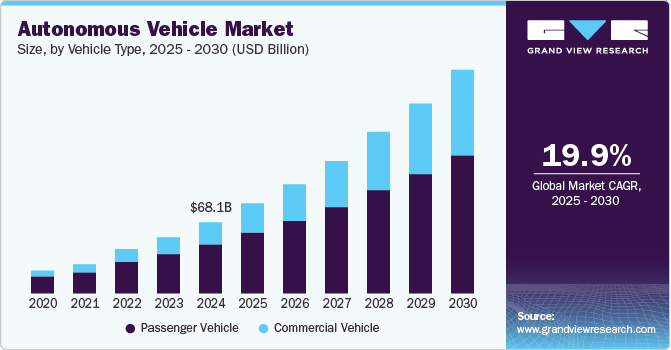Autonomous Vehicle Market: How Software-Defined Vehicles are Reshaping its Evolution

The global autonomous vehicle market was valued at USD 68.09 billion in 2024 and is projected to reach USD 214.32 billion by 2030, growing at a Compound Annual Growth Rate (CAGR) of 19.9% from 2025 to 2030. This industry's expansion is fundamentally driven by significant consumer demand for technological adoption, enhanced road safety, improved connectivity, and continuous advancements in Artificial Intelligence (AI) and sensor technology.
These technological advancements not only bolster vehicle safety and reliability but also broaden the scope of autonomous applications across various sectors, including logistics, transportation, ridesharing, and delivery services. The cost-efficiency realized through these innovations makes autonomous solutions increasingly attractive to businesses seeking competitive and innovative offerings.
Industries embracing self-driving transport are demonstrating a strong willingness to adopt innovative technology. As these sectors experience the benefits of increased efficiency, reduced costs, and enhanced safety provided by autonomous transport, it fosters further adoption and investment in autonomous vehicle technology across diverse domains. A notable development in this space is Hyundai Motor Group's launch of 'Pleos,' a new mobility software brand and platform aimed at advancing software-defined vehicles (SDVs) and creating an innovative in-vehicle app ecosystem. Unveiled at the Pleos 25 developer conference in Seoul, Pleos integrates vehicle operating systems, cloud infrastructure, autonomous driving capabilities, and fleet management tools to deliver enriched connected mobility experiences. Furthermore, Hyundai Motor Group has announced plans for Level 2+ autonomous driving by 2027 and introduced the Next Urban Mobility Alliance (NUMA) to encourage public-private collaboration for smart, cloud-based urban mobility solutions.
Key Market Trends & Insights
• Regional Dominance (North America): The North America autonomous vehicle market held a dominant share of over 37.1% in 2024. This is largely due to the region's robust infrastructure, particularly in areas like Silicon Valley, California, which provides an ideal environment for testing new technologies such as driverless cars. This existing infrastructure and supportive ecosystem significantly aid the development and adoption of autonomous systems.
• U.S. Market Evolution: The U.S. autonomous vehicle market is undergoing rapid evolution, fueled by substantial investments from tech and automotive giants including Tesla, Waymo, and GM's Cruise. Tesla is set to launch its robotaxi service in Austin by mid-2025, utilizing autonomous Model Y vehicles. Moreover, major cities are increasingly piloting autonomous vehicle programs, especially for ride-hailing and delivery services.
• Vehicle Type (Passenger Vehicle Leadership): By vehicle type, the passenger vehicle segment led the market, accounting for 69% of the global revenue in 2024. This is driven by a growing consumer interest in more convenient, safe, and efficient transportation options. Autonomous vehicles promise hands-free and stress-free commuting, appealing to individuals seeking a more relaxed and productive travel experience.
• Application (Transportation Dominance): In terms of application, the transportation segment commanded the largest market revenue share of 85.6% in 2024. This growth is attributed to autonomous technology's immense potential for efficiency and innovation. By offering safer and more effective transportation options and disrupting conventional travel and logistical practices, autonomous technology has the potential to fundamentally transform the movement of people and goods.
• Level of Autonomy (Level 1 Leadership): By level of autonomy, the Level 1 segment dominated the market with the highest revenue share in 2024. Basic driver assistance features, such as adaptive cruise control or lane-keeping assistance (classified as Level 1 autonomy), lead the autonomous market due to their ease of use and widespread integration into contemporary vehicles. These systems provide essential safety and convenience without requiring substantial infrastructure modifications or incurring high expenses.
Order a free sample PDF of the Autonomous Vehicle Market Intelligence Study, published by Grand View Research.
Market Size & Forecast
• 2024 Market Size: USD 68.09 Billion
• 2030 Projected Market Size: USD 214.32 Billion
• CAGR (2025-2030): 19.9%
• North America: Largest market in 2024
• Asia Pacific: Fastest growing market
Key Companies & Market Share Insights
The autonomous vehicle market is characterized by intense competition, with a few global players holding a significant share. The primary focus for these companies is on developing innovative products and fostering strategic collaborations. To enhance their market penetration and strengthen their competitive standing, these industry participants have employed various techniques.
- In May 2024, Renault Group initiated an innovative trial with WeRide, deploying electric and autonomous shuttles to facilitate access to the Roland-Garros stadium during matches. This initiative not only improved visitor access but also demonstrated the maturity of new technologies for automated public transport services.
Tesla, Inc., renowned for its electric vehicles and clean energy solutions, offers advanced driver-assistance features through its Full Self-Driving (FSD) software. This software provides capabilities such as automated lane changes, traffic-aware cruise control, and city street navigation. Tesla's vehicles, including the Model S and Model X, are equipped with hardware designed to support future autonomous driving enhancements. The company consistently updates its autonomous driving software via over-the-air updates, aiming to achieve full self-driving capabilities. Additionally, Tesla supports its vehicles with a global network of Superchargers, facilitating convenient long-distance travel.
Zoox, a subsidiary of Amazon, specializes in developing fully autonomous, purpose-built electric vehicles specifically for ride-hailing services. Unlike conventional cars that are retrofitted, Zoox's vehicles are uniquely designed to be bi-directional, lack a steering wheel or manual controls, and are engineered from the ground up for autonomy, targeting Level 5 automation, meaning no human intervention is required at any point. Their robotaxis utilize a sophisticated sensor suite, including lidar, radar, and cameras, combined with powerful onboard computing, to safely navigate complex urban environments. Zoox operates test fleets in major cities such as San Francisco, Las Vegas, and Seattle, and holds permits in California to test driverless vehicles without safety drivers. The company leverages advanced simulation for software validation and continuous improvement, aiming to redefine urban mobility with safe, efficient, and sustainable autonomous transportation solutions.
Key Players
• AUDI AG.
• Ford Motor Company
• Mercedes-Benz Group
• Nuro, Inc.
• Pony.ai
• Tesla
• Toyota Kirloskar Motor
• Volkswagen Group
• Waymo LLC
• Zoox, Inc.
Explore Horizon Databook – The world's most expansive market intelligence platform developed by Grand View Research.
Conclusion
The global autonomous vehicle market is driven by accelerating technological advancements in AI and sensor technology, enhanced road safety demands, and increased connectivity. These innovations are not only improving vehicle reliability and safety but also expanding autonomous applications across diverse sectors like logistics, ridesharing, and delivery services, offering businesses compelling cost efficiencies. Despite the market's competitive landscape, with a few key global players leading, strategic product development (such as Tesla's FSD software and Zoox's purpose-built robotaxis) and collaborative efforts (like the Hyundai Motor Group's 'Pleos' platform and NUMA alliance) are crucial for market penetration and establishing strong positions in this transformative industry.
- Art
- Causes
- Crafts
- Dance
- Drinks
- Film
- Fitness
- Food
- Giochi
- Gardening
- Health
- Home
- Literature
- Music
- Networking
- Altre informazioni
- Party
- Religion
- Shopping
- Sports
- Theater
- Wellness


